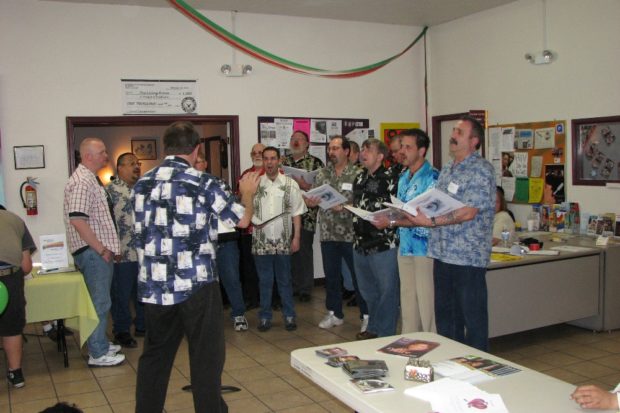
Longtime Fresno HIV/AIDS provider The Living Room will close on June 30 unless a miracle happens. However, director Toni Harrison isn’t waiting for that miracle to materialize. She hit the bricks at this year’s 20th Pride Parade and Festival, where supporters worked the crowd, buckets in hand collecting donations.
“We don’t want this to close, because of what we do,” Harrison said emphatically.
Donations can be dropped off at The Living Room, on Belmont Avenue near Broadway.
The organization is threatened with closure due to fallout from the recent decision by the county Board of Supervisors to close the Specialty Clinic at the health department. The clinic provided medical care and testing for people affected by HIV/AIDS and other sexually transmitted diseases.
“When the Board of Supervisors voted to shut down the Specialty Clinic,” Harrison said, “sixty-five people lost their care there. They were referred to Community Regional Medical Center, who told the county the hospital would not provide care for them unless CRMC got more money. So, our contract with the county was canceled.”
That translated to a loss of $69,000 a year.
The county’s public health director, Dr. Edward Moreno, confirmed that money was being redirected to CRMC to provide care for clients who don’t qualify for the county’s Medically Indigent Support Program.
On June 2, a group from The Living Room went to the health department to deliver a letter protesting the decision to county officials. After delivering that letter, the group walked to CRMC to deliver a similar letter there. Harrison said no one from hospital administration was available to accept the letter. “All the doors were locked.”
She added that CRMC was on alert because hospital security had been told a “mob of angry people” was going to show up and there was going to be a “riot.” Neither happened.
Health department officials sat down and explained what happened from their perspective.
“We do contracts in three-year cycles,” the Communicable Disease Division chief, Dr. David Luchini, explained, “and this contract was at the end of its cycle. Normally, a Request for Proposal would have been put out well ahead of time; however, the county didn’t get its state funding for this fiscal year until April (10 months into the fiscal year) and next year’s financial information wasn’t received until May. We didn’t know what services might be funded.”
He added that the only HIV/AIDS programs being funded at all in Fresno County are direct care and prevention services. “It’s safe to say that the only HIV/AIDS services being provided in California are being paid for with grants or Ryan White Act federal funds; there is no state or county general fund money available.”
Stephanie Garcia, a health department HIV/AIDS specialist, said the first priority is direct care.
“When the Board (of Supervisors) voted to close the clinic, 65 clients had to be moved to CRMC for their direct care, on top of their existing caseload,” Garcia said. “I can either provide case management or direct care; I cannot do both.” She added that the state focuses on outpatient ambulatory care.
Both Luchini and Garcia agree that “difficult decisions, heartbreaking decisions” have had to be made in the past three years.
Harrison says closing The Living Room would have immediate, negative impacts.
“For example, we provide services to 125 walk-in clients a month and have seen thousands over the years. We feed 140 HIV-positive people a month through our pantry; we also provide sack lunches to 170 homeless people a month–and that number is rapidly increasing,” Harrison said. “They will have nowhere to go if we have to close.”
Harrison confirmed The Living Room is seeking grants. “We’re also trying to change the county’s mind and get the money back,” she said. “Seeing this place close would be a sin.”
Luchini and Garcia confirmed a Request for Proposal will be put out for services. However, they said a needs assessment has to be done–which will take two or three months–to help select the services to be offered, always bearing in mind that direct patient care is the first priority.
They don’t expect the request to be out for response until January or February of 2011. A new contract would only cover years two and three of a three-year cycle and wouldn’t go into effect until July 1, 2011. Luchini said the county is considering discussing the possibility of the state doing the Request for Proposal, as doing that could free up more money for direct services.
Harrison fears that, without outreach services and testing, there will be a renewed epidemic on the scale of the 1980s. Garcia said the county is still providing HIV testing and will continue to link people to care through the Bridge Program–now known as the Minority AIDS Initiative Program–at the health department.
